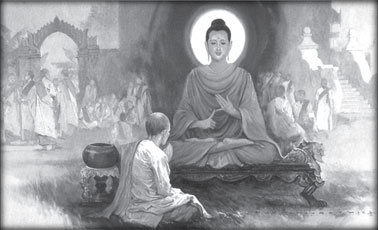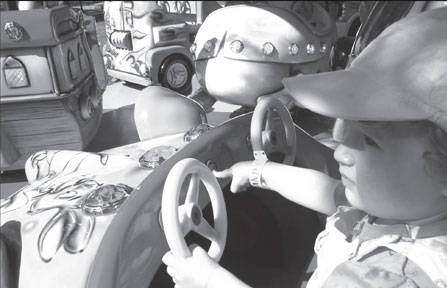Buddhist vision of life beyond consumerism
By Lionel Wijesiri
Today, consumerism is deeply embedded in the psyche of most of us in
urban Sri Lanka. Not only are we rewarded for spending more money, we
are cajoled and encouraged to do so. The advertising industry, itself a
hugely profitable business, is paid to inform us that what we have is
not enough.
Consumerism has become an artificial system that has been created for
the manipulation of the many for the benefit of a few.
 |
|
The Buddha addresses
Maha Prajapati Gothami |
Five decades ago, before the consumer-mentality arrived in our lives,
the person suggesting immoderation would not have been taken so
seriously. I remember my grandfather who had much less materially than
my parents, but as I know from taking long walks with him, listening to
his stories, playing games with him, seeking his help to build a pet
house, he was much happier than we are today. He was a simple man living
in spiritual traditions.
We talked about sustainability, simple living and the contentment
that comes from reducing material possessions. It was the most profound
and revealing few years of my life.
In simple terms, consumerism means “induced craving”. It is the
persistent promotion of cravings which our economic system has
vigorously encouraged: “Your neighbour has it. You will be happy when
you get it. You can have it now on easy credit.” My grandfather had the
blessing of not getting exposed to this crazy mania. That made him lead
a contented full life of 80 years. No debts! No worries! No health
problems, physically or mentally!
Scenario
Let me create a scenario. Imagine yourself living in a safe, pleasant
and unpolluted community where you actually know your neighbours and
interact with them, be it a small town, a suburb or even a city. You can
easily walk, cycle or take effective mass transit to your nearby job,
giving you time to think or read as you get there.
The work that you do improves your future, benefits your community
and means something to you and those with whom you interact. You
actually look forward to Monday. The longer that you are employed, the
more you learn and the more valuable you become to your employer and you
enjoy an increasing level of pay.
Your work schedule leaves you sufficient time to enjoy your friends,
family and outside interests. Money isn’t a controlling influence in
your life because your needs are easily met. Your possessions are few,
yet of high quality, thus allowing your home to be small, neat and
inexpensive to own or rent.
You’re connected to your surroundings, rather than just dwelling in
them; your backyard, for example, provides most of the produce you might
need, plus a surplus that you can trade with your neighbours. You have a
stake in your community and participate in local decision making at the
town council, PTA and other grassroots organisations.
You buy what is necessary in nearby establishments whose owners are
known to you and live in your community. If you have children, they walk
to a nearby well-funded neighbourhood school in safety and then learn
authentic social skills as they interact with a community of honourably
employed adults when away from school.
Occasionally, you need to travel to a large store on the edge of
town. You do this on a free shuttle bus or perhaps in a simple vehicle,
the use and costs of which you might share with others or a car that you
rent only when you need it. Your interests, the things that you really
like to do with your mind and your hands, all the possibilities of your
life, are there to be explored because you have the time, energy and
money to do so.
“Wait, this is 2013, Sri Lanka,” you might say. “This is not
possible, not any more.”
If you are among the lucky few who still have the kind of life
outlined above, these same forces will threaten you. Whether you live in
an isolated small town or prefer your anonymity as well as the
multiplicity of things available to you in a big city, these same forces
will be eroding your security and ability to make choices for yourself.
 |
|
We encourage even our
children to indulge in craving from their young ages |
Today, we voluntarily hand over our sovereignty as citizens in
exchange for things and conveniences that sap and paralyse our ability
to fight the forces that are weakening our personal economy and our
ability to change it.
Process
The process began innocently enough. At first they were a growing
number of pleasant conveniences for housewives in the 1950s, then a car
for everyone with the gradual and inevitable erosion of mass transit,
then the omnipresence of things and chemical products technologically
unimaginable a few decades earlier.
With this came a growing a availability of consumer credit and debt
to make things available, the over-dependence on labour-saving devices,
total dependence on the car and absolute necessity of full time work,
the two income household to pay for more and more, then the importation
of cheaper goods and the disappearance of manufacturing jobs, the
commodification of labour and the discarding of loyalties to our
citizens and taxpayers and now the decline of service work with
professionals next to be downsized....the list goes on and on.
Where will it end? Is it an overpopulated wasteland of pollution?
Eroded landscapes, worn out infrastructure and hungry people digging
into landfills for salvageable items?
Simply stated, there is a lot of money being made and a lot of power
being gathered by the people that promote consumerism. You pay for it in
gradually limited economic mobility, pollution, threats to your health
and a declining standard of living, as measured by the things that
really matter.
Maha Nidana Sutta
In Maha Nidana Sutta (Digha Nikaya), the Buddha says. “Thus it is,
Ananda, that because of sensation (vedana) comes craving (tanha);
because of craving, pursuit (pariyesana); because of pursuit, gain
(labha); because of gain, decision (vinicchaya); because of decision,
excitement (chandaraga); because of excitement, clinging (ajihosana);
because of clinging, enclosing (pariggaha); because of enclosing,
avarice (macchariya); because of avarice, guarding (arakkha); and
because of guarding there come to be the seizing of stick and weapon,
disunion, strife and quarrelling, slander, lying and many other
unskillful things”.
A man sees a beautiful advertisement for a block of land (vedana) and
desires to own it (tanha). He finds out who the owner is and negotiates
for a transfer (pariyesana). He buys the land (labha) and decides
exactly what he is going to plant there (vinicchaya). Having so decided,
he thinks about the money he will make, and the things he will do with
the money, and his thoughts excite him (chandaraga).
Thus excited, he clings to these pleasant dreams and to the land that
will make them come true (ajihosana). He encloses the land with a wall
or fence (pariggaha) and having so enclosed it, he becomes selfish,
feeling intensely and personally the intrusion of outsiders
(macchariya). He employs security guards, buys a gun, and prepares to
protect his property from the rest of the world (arakkha). Now, the man
is stressed. He has sleepless nights. He is scared whether a misfortune
will befall him.
Enemy
It is the same with other possessions. We cannot help perceiving
things, but when we desire them, the other consequences follow
inevitably. Its roots lie deeply, embedded in craving. Men accept it as
“common sense” because craving is common to all men, and they have no
sense.
There is always sensation (vedana), and so long as we are not
Arahats, there is always craving (tanha). Craving and its inevitable
results are man’s real enemies. If there was no craving, there would be
no pursuit, no gain, no decision, no excitement of desire, no clinging,
no enclosing, no selfishness, no guarding, no fear, no strife and no
sleepless nights. Craving is like the root of a long creeper whose
fruits are deadly poison.
The Buddha saw this truth clearly, all the time. That is why He urged
the utter destruction of craving, as the only means of deliverance. It
can be destroyed utterly, never to spring up again.
|



